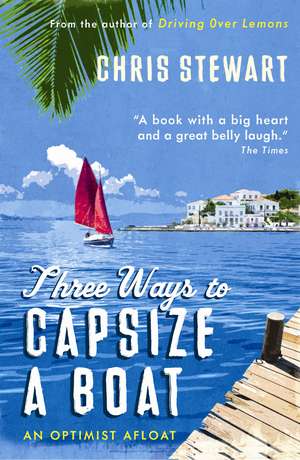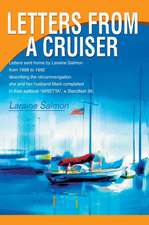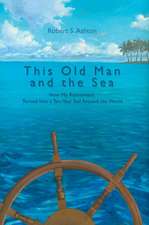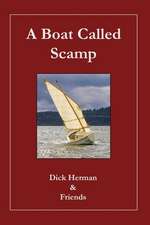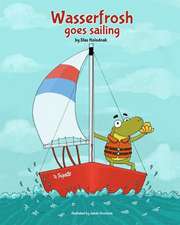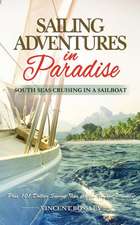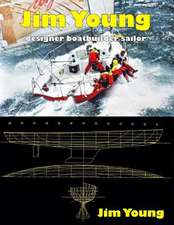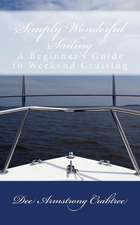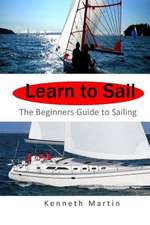Three Ways to Capsize a Boat: An Optimist Afloat
Autor Chris Stewarten Limba Engleză Paperback – 5 mai 2010
| Toate formatele și edițiile | Preț | Express |
|---|---|---|
| Paperback (2) | 52.67 lei 3-5 săpt. | +17.76 lei 5-11 zile |
| SORT OF BOOKS – 5 mai 2010 | 52.67 lei 3-5 săpt. | +17.76 lei 5-11 zile |
| BROADWAY BOOKS – 30 apr 2010 | 98.71 lei 3-5 săpt. |
Preț: 52.67 lei
Preț vechi: 62.65 lei
-16% Nou
10.08€ • 10.46$ • 8.40£
Carte disponibilă
Livrare economică 03-17 martie
Livrare express 15-21 februarie pentru 27.75 lei
Specificații
ISBN-10: 0956003842
Pagini: 180
Ilustrații: Illustrations
Dimensiuni: 128 x 198 x 20 mm
Greutate: 0.19 kg
Ediția:Main
Editura: SORT OF BOOKS
Colecția Sort of Books
Locul publicării:London, United Kingdom
Recenzii
Witty, self-deprecating and charming, Stewart makes wonderful company even if you do get soaked in the process. It's a book with a big heart and a great belly laugh
A charming and lyrical read, awash with the joy of discovery...I've never read a funnier description than his detailed advice on How to Pee at Midnight during a Force
It is easy to enthuse about the simple pleasures of life, but hard to write about them well. Stewart's gift is to do so with the carefree manner of someone you've just met in a bar, and who is buying the drinks
His enthusiasm and sheer good nature are infectious and, like Bill Bryson, with whom he's sometimes compared, he's a hard man to dislike
This is a lovely little book... you really get a sense of what it's like aboard an ocean-going sailing ship
Notă biografică
Chris Stewart shot to fame with Driving Over Lemons in 1999. Funny, insightful and real, the book tells the story of how he bought a peasant farm on the wrong side of the river, with its previous owner still resident. It became an international bestseller, along with its sequels - A Parrot in the Pepper Tree, The Almond Blossom Appreciation Society and The Last Days of the Bus Club.
In an earlier life, Chris was the original drummer in Genesis (he played on the first album), then joined a circus, learnt how to shear sheep, went to China to write the Rough Guide, gained a pilot's license in Los Angeles, and completed a course in French cooking. His sort of prequel, Three Ways to Capsize a Boat, fills in his lost years as a yacht skipper in the Greek islands.
Extras
Teach Yourself Sailing
It was Julie Miller who sent me to sea, one wet autumn afternoon in London’s Wandsworth Road. Now of course you haven’t a clue who Julie Miller is, and indeed why should you . . . but her relevance to this episode and subsequent adventures is that she had a great-aunt called Jane Joyce.
“Chris!” yelled Julie, who was more than a match for the thundering of London traffic. “What a fantastic coincidence. I’ve been longing to see you and there is something I particularly wanted to ask you . . . what was it now? Ah yes, how would you like a job looking after a yacht in the Greek Islands this summer?”
“I’d like that very much,” I replied, without so much as a thought. “As it happens I’m not too busy this summer.” Which was the long and the short of it, for at the tender age of twenty-nine my career as a sheep farmer had just hit the skids. The bank had refused any further loans to nurture the flock that my girlfriend, Ana, and I were tending on rented land in Sussex, and my “prospects” as my mother insisted on calling them, were not looking overly bright.
“Terrific,” said Julie. “That’s a very great relief. My great-aunt Jane has been on at me for weeks to find her a skipper, and I thought of you straightaway.”
Now this, it must be said, was a most peculiar thing for her to think. For I had never been on a boat before in my life, and I knew not the first thing about sailing. But I desperately wanted a job, so it struck me that it might be best to keep minor details like my complete and utter unsuitability for the job to myself.
clearly, the first thing to do was to bone up on boating, in order to conduct myself satisfactorily at the interview. So I bought Teach Yourself Sailing or some such guide and immersed myself in it. It was not, I thought, quite as gripping as a book on such an interesting subject ought to be, and I emerged from it with only the haziest notions of sailing and how it was done. If I had the pictures in front of me, I could tell the difference between a sloop (gaff-rigged or Bermuda), a schooner, a ketch, and a yawl; I had a very vague idea what beating and tacking and running were; I had learned the undesirability of jibing when running; and I could tell you more or less when to reef, or if things cut up really rough, to scandalize.
I did a little work on the vocabulary, too. I discovered that ropes were not actually ropes, but sheets, lines, halyards, warps, painters, stays, or ratlines. The toilet was not the dunny but the heads. Of course, the front wasn’t the front and the back wasn’t the back. . . . Then there was a fid and the bitts and take-alls, there were peaks, luffs, and clews; and if you didn’t feel too good, you could always heave to.
Friends and family were concerned about my cavalier attitude and horribly obvious ignorance. “What if you
tip the old bird into the drink?” they asked. “How would you live with yourself if you were to wreck the boat, or, worse still, drown the lot of them and yourself into the bargain?”
I pointed out the tautology, reassured them that things would turn out for the best, and dialed the number of
my patron-to-be. A pleasingly patrician American voice answered.
“But my dear, I have been simply longing for you to ring. Dear Julie has told me all about you and I simply cannot wait to meet you in the flesh, so to speak. However, things being as they are, I suppose I shall have to. So perhaps next Tuesday evening at eight o’clock would suit you?”
I returned my nose to the sailing book and tested myself one more time on vocabulary—full and by, jibing, reaching, tacking . . . goose wing, veering, backing. Then, got up like a dog’s dinner—I think I even wore a tie—
I rang the bell at two minutes to eight at a very opulent brick apartment block on the intimidatingly elegant south side of Cadogan Square. A tall, slightly stooped octogenarian opened the door. He had thick white hair and a bulbous nose and spoke quietly in a voice that was full of slowness and gentleness.
“Why, you must be Chris.” He offered me his hand, which I shook as firmly as I thought proper for one so frail. “Welcome. Come in. I’m Bob Joyce, but please call me Bob. Jane will be down shortly. In the meantime, perhaps you’d care for a drink.”
“I’ll have a whisky and soda,” I replied. It seemed the right drink for a captain, though I can’t remember ordering the drink by choice on any other occasion.
“Very sensible, too. Ice?”
“Er, yes, please.”
Bob busied himself at the drinks cabinet. I took stock of my surroundings—immense but rather gloomy opulence.
“Yes, you’re right, it is a little on the tenebrous side, but we’ve only taken it for a few months—and at least it’s warm.”
Funny . . . I hadn’t said anything.
“Here, have a seat, Chris. I believe you’re to be our skipper this summer?”
“Yes, that’s right, or, rather, I hope so.”
“Well, I hope so, too, Chris. Cheers. It’s no good talking to me about boats though; I hate the damn things. The boat is my wife’s hobby.”
A rustle of expensive materials, a scent of gardenias, and Jane was down.
“Chris, how good of you to come. I am charmed to meet you. Now, Bobby, have you given our skipper a drink? Yes, good, I see you have. Please sit down.”
Jane was a whirlwind of a woman, getting on for seventy, I supposed, but still quite a beauty, and with an air of ease and power. I fumbled for something nautical to say, but, hell, we didn’t want to get into all that stuff about heads and bitts just yet. Jane was running the show, anyway. Bob sipped his whisky and drummed his fingers on his knee.
Jane poured herself a drink and sat down opposite me, looking at me keenly as she made her assessment.
“Chris, I feel sure we shall get along wonderfully well; your references are impeccable. I won’t even tell you all the glorious things that dear Julie said about you—and Julie is a person whose opinions I take very seriously. Now, I imagine you know all there is to know about sailing, so we needn’t bother ourselves with that . . . ”
At one stroke Jane had removed the rope with which I might have hanged myself, but like an idiot I failed to take advantage of it. My brain was still in sailing mode, and instead of casting about for some subject about which I actually knew something, I was desperately trying to come up with something that would give Jane the impression that I was a nautical sort of a person.
“Is . . . is she a gaffer?” I spluttered.
“I beg your pardon, my dear?”
“I mean the boat, the yacht . . . is she a gaffer?”
“Is she a what?’ Her face took on a rather pained expression.
“A gaffer—you know, gaff-rigged . . . ”
“I haven’t the faintest idea, Chris. Does it matter?”
“No—no, not at all, just curiosity. I’d sort of like to know what manner of boat I’ll be sailing.”
“Well, I’ll tell you what I’ll do. I’ll send you the brochure and everything else, all the details, before you come.”
This was a piece of cake, like taking candy from a baby. Bob poured me another whisky while Jane filled me in on my duties. My pay would be fifty pounds a week plus a living allowance. I would collect the boat from where it was moored at a marina near Athens and sail it down to the island of Spetses, and there we would spend the summer. I would start in May, to get the boat ready for the Joyces’ arrival. Jane, in spite of the apparent grace of her carriage, was about to undergo a double hip transplant. The summer sailing season would start as soon as she recovered from the operation.
And that was that. I had passed the interview—albeit as the only applicant . . . which, thinking about it, is really my preferred sort of interview. All of a sudden I was a Greek island yacht skipper, with a bigger pay packet than I’d ever had before, and a long summer of sunshine and sailing before me. My ship, you might say, had come in.
I skipped ecstatically across Battersea Bridge, to where I was staying with my sister. And as I skipped, the first shadows of doubt began to form. From what I had seen of these Joyces, I liked them; and they were family to some cherished friends of mine. I didn’t want to let any of them down. Perhaps my critics were right, and it was time I started to take this business a little more seriously.
When I returned to Sussex, I took Ana to our local pub and told her about my amazing good fortune. Now, as luck would have it, there was, drinking in the pub at the time, an acquaintance of ours called Keith, who had for some months been trying to worm his way into the favors of Ana. I remember him as a rather malodorous person with a black beard, a boyish, chubby face, and not the remotest snowball in hell’s chance of making it with my woman, because—apart from anything else—he was too damn tight even to buy a round of drinks.
I was crowing to him about my exciting windfall when he stopped me and said: “It so happens that I’ve just bought my first boat. She’s moored at Littlehampton and I don’t have a car, so if you drive me down to the boat, I’ll give you a sailing lesson.”
We cemented the pact with a beer . . . which I bought.
This Way, Then That
A few days later, on a bone-chilling misty April morning, I found myself on the dock at Littlehampton, watching while Keith buggered about with what appeared to me meaningless and boring preparations for the forthcoming voyage. His boat was a bit of a disappointment, too—a grotty little twenty-one-foot craft banged together out of plywood and tin. It had the advantage, though, he told me, of being extremely cheap. She was called, whether coincidentally or not, Ana, and this set me to wondering just what sort of hideous designs Keith had on my girlfriend. Still, you don’t look a gift horse in the mouth . . . and you certainly didn’t want to look Keith in the mouth; his halitosis, poor boy, could drop a man at fifty feet. He worked for the Department of Health and Social Security.
After an eternity of fidgeting about with ropes and a bucket, Keith started the outboard motor. Pibble pibble ibble obble ibble obble, it went. We slipped the mooring lines and pottered out into the river, then down past the pier and out into the high sea. I stood half frozen by the mast, thinking of Odysseus leaving Ithaca, and trying to look important and knowledgable.
Two minutes after passing the head of the pier we were surrounded by mist. I forgot Odysseus and started to think of the Ancient Mariner. This, then, must be the sea, I thought. It was calm, with just a faintly disagreeable heaving about it, and you couldn’t see a thing. I shivered. Keith turned the engine off, which was a blessing as the sound it made was extremely irritating. Silence . . . apart from the slop of the waves against the side of the boat, and the drip, drip of the water condensing on the rigging.
“Right,” said Keith excitedly. “Time to get the sails up.”
I went below, where, confined in a tiny and evil-smelling space it was even more unpleasant than above, and passed the sails out to Keith. Then, with a mild feeling of nausea I helped him unfold them and fix them to the various shackles and stays. This was good, as it engaged me in meaningful occupation for a minute or two. We hoisted the sails, made fast their ropes, and, with Keith taking the tiller, sat back to watch what happened.
“We’re sailing!” cried Keith, beside himself with excitement. I couldn’t see it myself; as far as I could gather we were just bobbing up and down in a great wet white bowl of nothingness. It was chilly and damp and I was thinking to myself that perhaps I had made a terrible mistake, because if this was sailing, then I didn’t like it, not one little bit.
“Look, we’re actually making headway, we’re bowling along,” shouted Keith in an excess of misplaced euphoria. I licked my finger and held it up to see if I could detect any breeze, cat’s paw, zephyr, or other sign of movement. Nothing. He pulled the tiller over and shouted the words, “Ready about . . . LEE HO!” I stared at him incredulously. What sort of thing was that for one sensible adult to shout at another?
The boom swung gently toward us. It seemed we were supposed to duck under it and shuffle onto the other side of the cockpit, keeping the ropes in hand as we went. The boat apparently swung round but, although we were now ostensibly facing a different direction, nothing else seemed to have changed. Actually, it was impossible to be sure where you were facing, as the closeness of the thick white fog had a peculiarly disorientating effect. I no longer knew where the shore was, even though it couldn’t have been as much as a hundred yards off.
We ate our cheese and tomato sandwiches in silence, more as a way of relieving the monotony than because we were hungry. In a desultory fashion I read bits of my book about sailing, but if the truth be told, I was going off the whole thing fast. For most of that long, gloomy April day we went bobbing first this way, then that, in the middle of nowhere. Occasionally we would drag a finger in the water to see if we could perceive any sign of movement. The fog sat heavy on the sea and refused to lift. From somewhere came the mournful whooing of a foghorn buoy and the halfhearted clank of a bell. This was just about as depressing as a thing could be.
Finally Keith, too, decided that he’d had enough. He started the engine and we turned to where he reckoned the pier was. We were actually a fair way off; I suppose the tide must have taken us. The fog lifted just a little bit, and we could see in the distance the pier that ran out from the mouth of the river. Slowly, unbelievably slowly, we approached it. I could hardly believe how slow our progress was. It took us the best part of an hour to cover what must have been less than a quarter of a mile, and the closer we got to it, the slower our rate of approach seemed to be. As we puttered beyond the lighthouse on the end of the breakwater, an ordinary garden snail could have given us a run for our money.
Descriere
From the author of "Driving Over Lemons" comes this humorous account of his stint as skipper for the summer, sailing a Cornish Crabber around the Greek islands. It was Stewart's dream job, and there was just one tiny problem--he had never sailed before.
